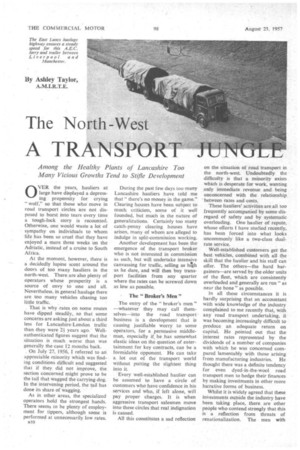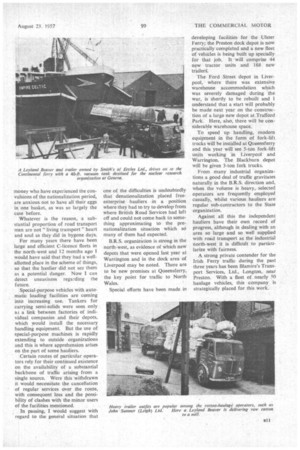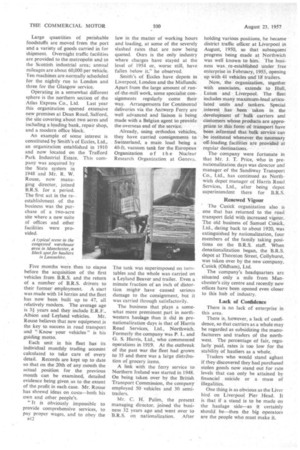The North-West
Page 44

Page 45

Page 46

If you've noticed an error in this article please click here to report it so we can fix it.
A TRANSPORT
Among the Healthy Plants of Lancashire Too Many Vicious Growths Tend to Stifle Development
OVER the years, hauliers at large have displayed a depressing propensity for crying " wolf," so that those who move in road transport circles are not disposed to burst into tears every time a tough-luck story is recounted. Otherwise, one would waste a lot of sympathy on individuals to whom fife has been so cruel that they have enjoyed a mere three weeks on the Adriatic, instead of a cruise to South Africa.
. At the moment, however, there is a decidedly lupine scent around the doors of too many hauliers in the north-west. There are also plenty of operators whose prosperity is a source of envy to one and all. Nevertheless, in general haulage there are too many vehicles chasing too little traffic. , .That is why rates on some routes have dipped steadily, so that some concerns are asking just about a third less for Lancashire-London traffic than They were '2+ years ago. Well. authenticated figures suggest that the situation is . much worse than was generally the case 12 months back.
. On July 27., 1956, I referred to an appreciable minority which was finding conditions difficult and suggested that if they did not improve, the section concerned might prove to be the tail that wagged the carrying dog. In the intervening period, the tail has done its share of wagging.
As in other areas, the specialized operators hold the strongest hands. There seems to be plenty of employment for tippers, although some is performed at unnecessarily low rates.
al0 During the past few days too many Lancashire hauliers have told me that" there's no money in the game." Clearing houses have been subject to much criticism, some of it well founded, but much in the nature of generalizations. Certainly too many catch-penny clearing houses have arisen, many of whom are alleged to indulge in split-commission working.
Another development has been the emergence of the transport broker who is not interested in commission as such, but will undertake intensive canvassing for traffic, selling as high as he dare, and will then buy transport facilities from any quarter where the rates can be screwed clown as low as possible.
The "Broker's Men"
The entry of the "broker's men" —whatever they may call themselves—into the road transport business is a development that is causing justifiable worry to some operators, for a persuasive middleman, especially if he has somewhat elastic ideas on the question of entertainment for key contracts, can be a formidable opponent. He can take a lot out of the transport world without putting the slightest thing into it.
Every well-established haulier can be assumed to have a circle of customers who have confidence in his services and who, if left alone, will pay proper charges. It is when aggressive transport salesmen move into these circles that real indignation is caused.
All this constitutes a sad reflection on the situation of road transport in the north-west. Undoubtedly the difficulty is that a minority exists which is desperate for work, wanting only immediate revenue and being unconcerned with the relationship. between rates and costs.
These hauliers' activities are all too frequently accompanied by some disregard of safety and by systematic overloading. One haulier of repute, whose efforts I have studied recently, has been forced into what looks uncommonly like a two-class dualrate service.
Well-established customers get the best vehicles, combined with all the skill that the haulier and his staff can offer. The others—the hard bargainers—are served by the older units of the fleet, which are consistently overloaded and generally are run" as near the bone" as possible.
In all these circumstances it is hardly surprising that an accountant with wide knowledge of the industry complained to me recently that, with any road transport undertaking, it was becoming increasingly difficult to produce an adequate return on capital. He pointed out that the interest rates represented by the dividends of a number of companies with which he was concerned compared lamentably with those arising from manufacturing industries. He thought there was a definite tendency for even dyed-in-the-wool road transport men to hedge their finances by making inveslments in other more lucrative forms of business.
Whilst it is Widely agreed that these investments outside the industry have been taking place, there are other people who contend strongly that -this is a reflection from threats of renationalization. The men with money who have experienced the convulsions of the nationalization period, are anxious not to have all their eggs in one basket, as was so largely the case before.
Whatever is the reason, a substantial proportion of road transport men are not "living transport" heart and soul as they did in bygone days.
For many years there have been large and efficient C-licence fleets in the north-west and 12 months ago I would have said that they had a wellallotted place in the scheme of things, so that the haulier-did not see them as a potential danger. Now I can detect uneasiness regarding the future.
Special-purpose vehicles with automatic loading facilities are coming into increasing use. Tankers for carrying semi-solids were seen only a.3 a link between factories of individual companies and their depots, which would install the necessary handling equipment. But the use of special-purpose machines is rapidly extending to outside organizations and this is where apprehension arises on the part of some hauliers.
Certain routes of particular opera. tors rely for their continued existence on the availability of a substantial backbone of traffic arising from a single source. Were this withdrawn it would necessitate the cancellation of regular services over the route, with consequent loss and the possibility of clashes with the minor users of the facilities mentioned.
In passing, I would suggest with regard to the general situation that one of the difficulties is undoubtedly that denationalization placed freeenterprise hauliers •in a position where they had to try to develop from where British Road Services had left off and could not come back to something approximating to the prenationalization situation which so many of them had expected.
B.R.S. organizas tion is strong in the north-west, as evidence of which new depots that were opened last year at Warrington and in the dock area of Liverpool may be noted. There are to be new premises at Queensferry, the key point for traffic to North Wales.
Special efforts have been made in developing facilities for the Ulster Ferry; the Preston dock depot is now practically completed and a new fleet of vehicles is being built up specially for that job. It will comprise 44 new tractor units and 168 new trailer.
The Ford Street depot in Liverpool, where there was extensive warehouse accommodation which was severely damaged during the war, is shortly to be rebuilt and I understand that a start will probably be made next year on the construction of a large new depot at Trafford Park Here, also, there will be considerable warehouse space.
To speed up handling, modern equipment in the form of fork-lift trucks will be installed at Queensferry and this year will see 5-ton fork-lift units working •in Liverpool and Warrington. The Blackburn depot will be given 3-ton fork trucks.
From many industrial organizations a good deal of traffic gravitates naturally in the B.R.S. direction and, when the volume is heavy, selected operators are frequently employed casually, whilst various hauliers are regular sub-contractors to the State organization.
Against all this the independent hauliers have their own record of progress, although in dealing with an area so large and so well supplied with road transport as the industrial north-west it is difficult to particularize with fairness.
A strong private contender for the Irish Ferry traffic during the past three years has been Blamire's Transport Services, Ltd., Longton, near Preston. With a fleet of nearly 50 haulage vehicles, this company. is strategically placed for this work. Large quantities of perishable foodstuffs are moved from the port and a variety of goods carried in for shipment. Overnight traffic facilities are provided to the metropolis and to the Scottish industrial area: annual mileages are about 60,000 per Vehicle. Ten machines are normally scheduled for the nightly run to London and three. for the Glasgow service.
Operating in a somewhat different sphere is the northern section of the Atlas Express Co., Ltd. Last year this organization opened extensive new premises at Dean Road, Salford, the site covering about two acres and including a loading bank, repair shop, and a modern office block. '
An example of some interest is constituted by Smith's of Eccles, Ltd., an organization established in 1910 and now located on the Trafford Park Industrial Estate. This company was acquired by the State system in 1948 and Mr. R. W. Rouse, now mana ging director, joined B.R.S. for a period. The first act in the re. establishment of the business was the purchase of a two-acre site where a new suite of offices and other facilities were pro vided.
Five months were then to elapse before the acquisition of the first vehicles from B.R.S. and the return of a number of B.R.S. drivers to their former employment. A start was made with 14 lorries and the fleet has now been built up to 47, all relatively modern. The average age is 3iyears and they include E.R.F., Albion and 'Leyland vehicles. Mr. Rouse believes that new equipment is the key to success in road transport and "Know your vehicles" is his guiding motto.
Each unit in his fleet has its individual monthly trading account calculated to take care of every detail. Records are kept up to date so that on the 20th of any month the actual position for the previous month can be examined, detailed evidence being given as to the extent of the profit in each case. Mr. Rouse has shrewd ideas on costs—both his own and other people's.
" It is obviously impossible to provide comprehensive services, to pay proper wages, and to obey the a 1 2 law in the matter of working hours and loading, at some of the severely slashed rates that are now being quoted. Ours is the only industry where charges have stayed at the level of 1954 or, worse still, have fallen below it," he observed.
Smith's of Eccles have depots in Liverpool, London and the Midlands. Apart from the large amount of runof-the-mill work, some specialist consignments regularly come their way. Arrangements for Continental deliveries via the Antwerp Ferry are well advanced and liaison is being made with a Belgian agent to provide the overseas end of the service.
Already, using orthodox vehicles, they have carried consignments to Switzerland, a main load being a 40-ft. vacuum tank for the European Organization of the Nuclear Research Organization at Geneva.
The tank was superimposed on turntables and the whole was carried on a Leyland Beaver and trailer. Even a minute fraction of an inch of distortion might. have caused serious damage to the consignment, hut it was carried through satisfactorily.
The business that plays a somewhat more prominent part in northwestern haulage than it did in prenationalization days is that of Harris Road Services, Ltd., Northwich. Formerly the company was P. L. and G. S. Harris, Ltd., who commenced operations in 1919. At the outbreak of the past war the fleet had grown to 35 and there was a large distribution of grocery items.
A link with the ferry service to Northern Ireland was started in 1948. On being taken over by the British Transport Commission, the company employed 50 vehicles and 30 semitrailers.
Mr. C. H. Palim, the present managing director, joined the business 32 years ago and went over to 13.R.S. on nationalization. After holding various positions, he became district traffic officer at Liverpool in August, 1950, so that subsequent progress being made at North wich was well known to him. The business was re-established under free enterpriseln February, 1955, opening up with 41 vehicles and 18 trailers.
Now, the organization, together with associates, extends to Hull, Luton and Liverpool. The fleet includes many maximum-load articulated units and. tankers. Special interest has been taken in the .development of bulk carriers and customers whose products are appropriate to this form of transport have been informed that bulk service can be instituted whenever the necessary off-loading facilities are provided at regular destinations.
The company were fortunate in that Mr. J. T. Price, who in prenationalization days was director and manager of the Sandiway Transport Co., Ltd., has continued as Northwich depot manager of Harris Road Services, Ltd., after being depot superintendent there for B.R.S.
Renewed Vigour The Cusick organization also is one that has returned to the road transport field with increased vigour. The old business of Samuel Cusick, Ltd., dating back to about 1920, was extinguished by nationalization, four members of the family taking positions on the 13.R.S. staff. When denationalization began, the B.R.S. depot at Thornton Street, Collyhurst, was taken over by the new company, Cusick (Oldham), Ltd.
The company's headquarters are situated. only a mile from Manchester's city centre and recently new offices have been opened even closer to this hub of industry.
Lack of Confidence There is no lack of enterprise in this area.
There is, however, a lack of confidence, so that carriers as a whole may he regarded as subsidizing the manufacturers and traders of the northwest The percentage of fair, regularly paid, rates is too low for the stability of hauliers as a whole.
Traders who would stand aghast if they discovered they had purchased stolen goods now stand out for rate levels* that can only he attained by financial suicide or a mass of illegalities.
One thing is as obvious as the Liver bird on Liverpool Pier Head. It is that if a stand is to be made on the haulage side—as it certainly should be—then the big operators are the people who must make it.




































































































